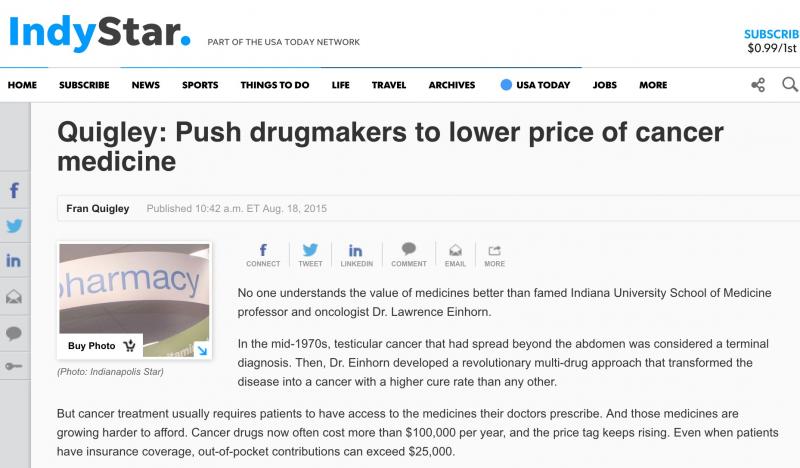
This article originally appeared in the Indianapolis Star. Read it there, or below:
No one understands the value of medicines better than famed Indiana University School of Medicine professor and oncologist Dr. Lawrence Einhorn.
In the mid-1970s, testicular cancer that had spread beyond the abdomen was considered a terminal diagnosis. Then, Dr. Einhorn developed a revolutionary multi-drug approach that transformed the disease into a cancer with a higher cure rate than any other.
But cancer treatment usually requires patients to have access to the medicines their doctors prescribe. And those medicines are growing harder to afford. Cancer drugs now often cost more than $100,000 per year, and the price tag keeps rising. Even when patients have insurance coverage, out-of-pocket contributions can exceed $25,000.
That cost means as many as 20 percent of cancer patients do not take their treatment as prescribed. It is a state of affairs that is unacceptable to physicians like Einhorn. (Full disclosure: I am one of Dr. Einhorn’s patients.)
“There is no question that you need an incentive to develop new medicines,” Einhorn said in an interview. “But, in terms of cost, how much is too much? You have families facing bankruptcy due to the cost of health care, and medicines are a part of that problem.”
Last month, Einhorn and 117 other leading U.S. cancer experts co-authored a commentary in the journal Mayo Clinic Proceedings, pointing out that drug companies have been hiking the cost of medicines by leaps and bounds that far exceed the rate of inflation.
“This raises the question of whether current pricing of cancer drugs is based on reasonable expectation of return on investment or whether it is based on what prices the market can bear,” the oncologists wrote.
These doctors are not the only ones to question whether the pharmaceutical industry is taking undue advantage of monopoly patent pricing. Gildead has set the cost of its Hepatitis C medicines at a remarkable $84,000 for a 12-week regimen. The medicines are enormously effective, but their equally enormous cost is triggering budget crises in the Veterans Administration and state Medicaid programs.
Pharmaceutical companies argue that prices like these are necessary to support research and development. But a growing number of patients and lawmakers point out that many medicines, including the Hepatitis C wonder drugs, were developed in significant part by taxpayer funding.
In their article, Einhorn and his fellow oncologists call for the Medicare program to be allowed to negotiate the price of drugs, and for limits on patent-holders delaying the availability of generic alternatives. And they urge cancer patients to follow the lead of HIV/AIDS patients, whose political advocacy led to a sharp decrease in drug costs.
Fittingly, the physicians’ commentary concludes with this prescription for activism, a sure-fire cure for out-of-control medicine costs. “It should be possible to focus the attention of pharmaceutical companies on this problem,” they write. “And to encourage our elected representatives to more effectively advocate for the interests of their most important constituents among the stakeholders in cancer — American cancer patients.”
